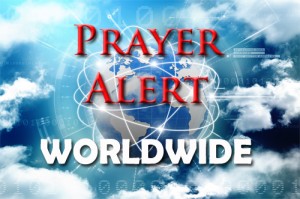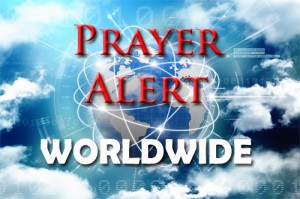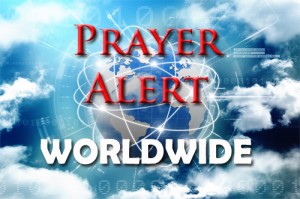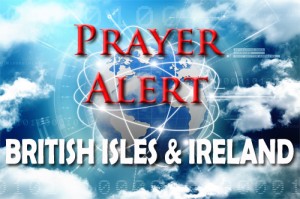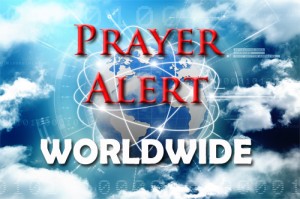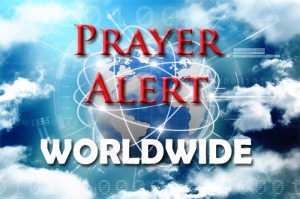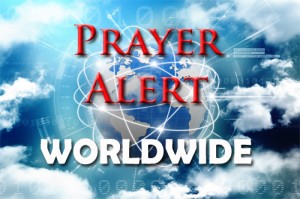Displaying items by tag: Africa
South Africa: ‘Uprising’
A youth prayer movement is springing up in the nations, and South Africa’s ‘Uprising’ event (4 to 6 October) is about to ignite the spiritual atmosphere over South Africa. Their website states, ‘We, the youth, are saying that we are uniting in prayer, rising as a body of young people, forming a revival wave, taking a stand, marching to the gates of Hell to give the devil back his surname and take our identity back. Black or white, every tribe, we are putting our differences aside and praying non-stop with every young person across South Africa, Africa and around the world, because where there is united prayer (Psalm 133:1-3) God is present, and where God is, there is hope, love, transformation and honour.’ We can ask God to protect all delegates travelling to the event, and for the strength and stamina of organisers and speakers. Pray for consistent electricity and internet supplies into the venue to enable clear, far-reaching teaching and fluid unbroken worship.
Ghana: rescued from slavery
Kofi was eight years old when his mother introduced him to a nice man who told them he would take Kofi to live with him and enrol him in school, giving him the future his mother couldn’t give him. It was all a lie. For two years, Kofi was a slave to a boatmaster on Lake Volta in east Ghana. He woke at dawn to dive deep into the lake, holding his breath as he used his small fingers to untangle the nets caught on underwater tree stumps. He knew some boys drowned doing this. One day a strange boat pulled near. He knew it was different from others he’d been on when someone handed him a lifejacket to ensure he was safe. The boat was filled with police and IJM workers. Pray that IJM fulfils its plan to ‘eliminate the slave trade everywhere’.
Nigeria: massacres shatter peace efforts
Christian leaders in the central Plateau State argue that there is a religious dimension to Fulani attacks on villages; unless politicians acknowledge this, they cannot properly address the conflict. On 28 August in Jos, a Christian peace summit for the northern regions was ending. 100 miles away, at the same time, Fulani militants set ablaze Rev Adamu Wurim Gyang and his three children. They were burnt beyond recognition. His wife Jummai was left to die in a pool of blood. 95 houses were torched, 225 crops awaiting harvest were destroyed, at least 14 were killed, and many wounded. CSW said that after the perpetrators had gone the military arrived, killing a woman who tried to stop them detaining local youths who wanted them to go after the Fulani militia instead. A video verified by World Watch Monitor shows people holding up her body, and Rev Ezekiel Dachomo appealing for assistance from the US, UK, and the UN, saying, ‘An Islamic agenda is taking over the nation’.
Eritrea: potential for change
Eritrea could be on the verge of major change. For 20+ years, it has battled with Ethiopia and Somalia. President Afewerki’s regime conscripts citizens indefinitely into fighting its wars, and represses opposition. Much of Eritrea’s money has gone to defence against enemies, resulting in it being one of the poorest countries, with a mass exodus of Eritreans to Europe part of the biggest global migration crisis since World War II. However, Ethiopia now has a new prime minister, Abiy Ahmed. He has already made a number of significant changes to government policy, including freeing thousands of political prisoners and amending a harsh anti-terrorism law. He has extended a hand of peace to Eritrea and agreed to a peace deal. Thousands of people celebrated, the border is open, embassies will open, and the countries will work together to strengthen ports, resume air flights, open telephone lines, and more. Afewerki’s regime has made Christians suffer as the 6th worst persecuted in the world, but Abiy has recently released 35 Christians from prison. Pray for Islamic extremists in the region to lose their power due to his influence.
Tunisia: Muslim leader calls for conquest of nations
Recently, at an Islamic Caliphate conference, Said Khecharem, who is affiliated with the pro-Sharia, pro-caliphate organisation Hizb- ut-Tahrir, declared that the ‘establishment of an Islamic state requires the conquest of America, Britain, Russia, France, and Italy. Other infidel lands will be conquered, Allah willing.’ According to the Middle East Media Research Institute, he also said, ‘The most important thing is to restore the rule of the Muslims, through the Quran and the Sunna, in order to renew Islamic life and to deliver the Islamic message to the world. My brothers, the implication of this today should be the establishment of an Islamic state over all the lands of the infidels.’ Some in the west are noting that even now relatively few mosques or Islamic schools teach young Muslims why they should reject the violent understanding of Islam taught by al-Qaeda, IS, and other terror groups.
Goodbye ‘rock fame’, hello adventures with God
Jean du Rand’s father leads a vibrant church, and there were Afrikaans Baptist pastors on his mother’s side; but in 2010, while a member and songwriter in a successful South African band, and still in his teens, he became involved in alcohol and drugs. He didn’t find the happiness that this lifestyle was supposed to bring, and during a university lecture he experienced God’s presence. The Holy Spirit said, ‘You know Jean, I have plans for your life. You can come with Me now and leave this place, or you can come in five years. I’m going to use you either way, and it’s up to you how much pain you want to traverse.’ Jean chose ‘now’. He is now about to release some Afrikaans worship songs ‘with a difference’. You can hear one of his songs on Youtube:
PM visits Africa ahead of Brexit
Theresa May visited Africa on a major mission to build up new trade relations ahead of Brexit. Pray that every detail of conversations with South African, Nigerian and Kenyan leaders will be used to re-engage with a fast-growing continent which some feel British business and politicians have neglected in recent years. Pray that the delegates who travelled with her (trade minister George Hollingbery, minister for Africa Harriett Baldwin, secretary of state for Wales Alun Cairns, a Stock Exchange representative, and the Lord Mayor of London Charles Bowman) will in the future be able to build on the links made. A Government statement before the visit stated, ‘This comes at a time of enormous change across Africa with a unique opportunity, as the UK moves towards Brexit, for a truly global Britain to invest in and work alongside African nations, with mutual benefits.’
Mauritania: national assembly election
On 1 September, the North African desert country Mauritania will have an election for its national assembly. 146 members will be elected for one- or four-year terms. Most of its population is nomadic, but a third of Mauritanians are registered voters. It is one of the world's poorest nations, and one of the most religiously restricted. Sunni Islam and Sharia law have ruled them over a thousand years. The government prohibits conversion to Christianity. Those who do so face the death penalty, and must not enter non-Muslim households. A caste system grants privileges to certain groups. They marginalise darker-skinned Mauritanians or anyone who holds a worldview other than Islam. The Islamic terror group AQIM (Al-Qaeda in the Islamic Maghreb) operates in Mauritania.
Kenya: Freedom Sunday
IJM has released a Freedom Sunday promo video to media houses, churches, and the general public in Kenya. We have been asked to pray for a positive reception and widespread engagement from the Kenyan church. This video is unique in bringing together leaders from a variety of Christian denominations (including Catholic, Anglican and evangelical) to speak with one voice about the role of the church in addressing police abuse in Kenya. Pray that many churches will participate in Freedom Sunday, and that members will be moved to help vulnerable families in their communities who have suffered from police abuse. Pray for an unprecedented number of churches to dedicate Sunday 23 September to ending slavery and helping to rescue every child, woman and man living in slavery.
Kenya: Theresa May visit
At the time of writing Theresa May is visiting Kenya. There is a desire for both countries to develop trust and trade in the future. On her visit the PM was joined by several ministers and 29 business representatives from various industries. We can pray that her visit will initiate and bolster improved post-Brexit trade and cultural ties between the nations. Many believe that in the past Britain has not treated Kenya with equality, but rather as a bully, while the Chinese have humbly generated business: statistics show that China has dwarfed UK imports to Kenya over the last three decades. Pray for the West to rethink foreign policy. One of the Kenya-UK partnership agreements was a commitment to improve lives of people living with disability.
